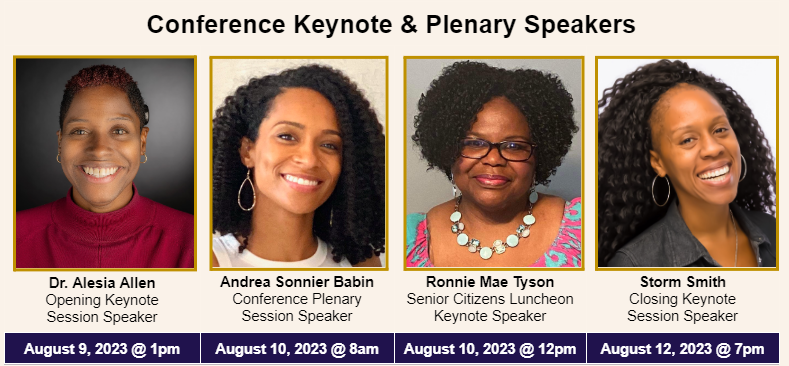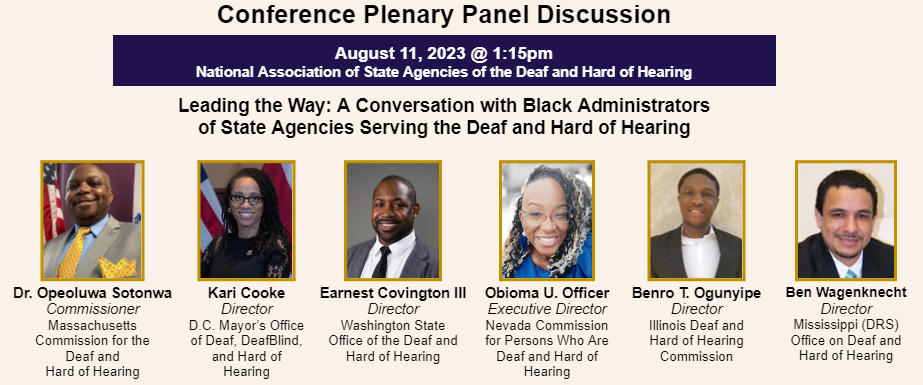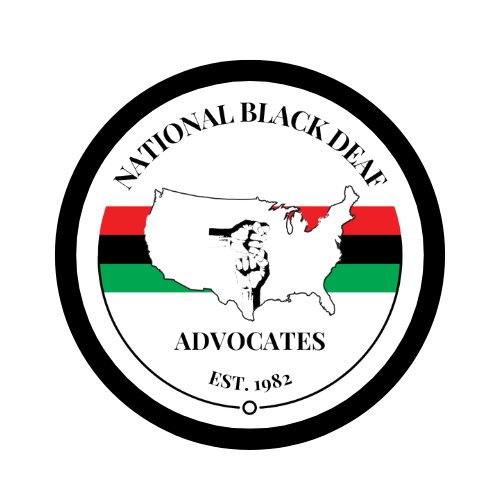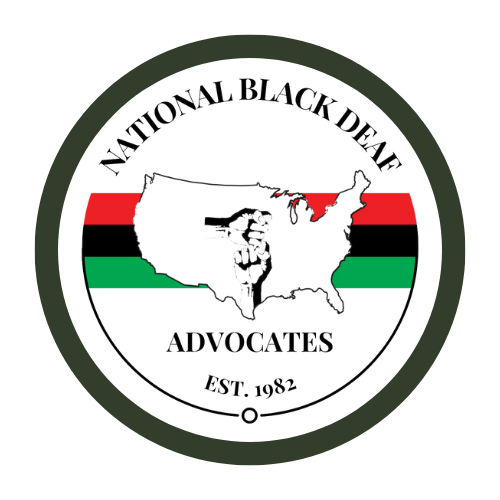2023 NBDA National Conference
Reconnecting to Thrive Together: Reconnect, Recharge, Thrive!
August 8-13, 2023
Sheraton Birmingham Hotel
Birmingham, Alabama


*RID CEUs will be offered for all possible workshop sessions sponsored
by an approved RID CMP Sponsor.
========Keynote & Plenary Sessions========
Opening Keynote Speaker: Dr. Alesia Allen
Conference Plenary Speaker: Andrea Sonnier Babin
Senior Citizens Luncheon Keynote Speaker: Ronnie Mae Tyson
Closing Keynote Speaker: Storm Smith
======Plenary Panel Discussion Session=======
Leading the Way: A Conversation with Black Administrators of State Agencies Serving the Deaf and Hard of Hearing
National Association of State Agencies of the Deaf and Hard of Hearing (NASADHH) will hold a panel discussion and be represented by all-BIPOC state administrators. The panelists will engage in a roundtable discussion format with
the audience to address how deaf and hard of hearing state agencies can maximize collaborations with black deaf communities. Discussion will also include how Black Deaf state administrators are addressing key issues within their
states and how they are utilizing their lived experiences to shape policy initiatives. They will also offer leadership advice to the audience who may be interested in pursuing careers in the public sector.
Dr. Opeoluwa Sotonwa, Commissioner, Massachusetts Commission for the Deaf & Hard of Hearing
Kari Cooke, Director, D.C. Mayor’s Office of Deaf, DeafBlind, & Hard of Hearing
Earnest Covington III, Director, Washington State Office of the Deaf and Hard of Hearing
Obioma U. Officer, Exec. Director, Nevada Commission for Persons Who Are Deaf & Hard of Hearing
Benro T. Ogunyipe, Director, Illinois Deaf and Hard of Hearing Commission
Ben Wagenknecht, Director, Mississippi (DRS) Office on Deaf and Hard of Hearing
=========Presentation Sessions=========
A Interconnectedness Pathway In the Leadership Development Model
Presenter: Franly Ulerio-Nunez
Category: Leadership Development & Mentoring
A chain of command in an organizational system conunitually disconnects a feeling of self-beloning from the community. Therefore, the struggles in fostering a quality of leadership development are prevailing across the marginalized
members. The climate of fear within organizations and business entities is increasing at an unprecedented rate. It disempowers employees and community members from authentic engagement in the shared space. The restorative approaches
with a principle of interconnectedness rebuild collective awareness. A principle of interconnectedness transmutes corporate-boss centric structure into a dignity-self-belonging structure in the organization and business entities..
African American English – Our Language and How It Impacts Interpreting
Presenter: Sharon Hill
Category: History, Language & Culture
African American Language is used by many in the Black/African-American community. Yet, for many, it is not considered a language and some consider it to be “bad English” or “street talk”. Learn more about this rich language
and explore research that shows its value in the deaf community and in the work of ASL/English interpreters.
Are You Healthy & Whole?
Presenter: Donte Little
Category: Health Issues
Research has shown that there is an intricate connection between an individual’s physical, mental, and spiritual health—like a three-legged stool. Although we often focus on the two front legs of physical and mental health, we tend
to forget the important back leg of spiritual health. Through laughter and engagement, this presentation will inform and encourage attendees about promoting their spiritual health.
Audistic, Linguistic, & Racial Battle Fatigue: A Cultural Taxation of Black Deaf Faculty Members
Presenter: Rezenet Moges-Riedel
Category: Educational Success & Opportunities
The Black Deaf faculty members serving higher education institutions across the U.S. nation. Some narratives will be selected from several Black Deaf participants sharing about their intersectional experiences and how their retention
is on the brink of a fallout. The cultural taxation of these members will be covered so there may be some audience interaction to discuss and elicit some personal challenges of the intersectionality of being Black and Deaf.
Best Decision Ever: Historically Black Colleges and Universities and Deaf Students
Presenters: Lissa Ramirez-Stapelton, Tia Ivanko & Latisha Porter-Vaughn
Category: Educational Success & Opportunities
How do you decide which college is right for you? Could a historically Black college support your academic dreams? This workshop will provide resources for what students and parents should consider when navigating higher education
and selecting a college, share an overview of the historical and current connections between HBCUs and Deaf students, and conclude with a panel discussion with Deaf students sharing their college experiences at an HBCU. The past
relationships between HBCUs and Black Deaf education give us hope that HBCUs can continue to be a supportive and culturally enriching academic home for Black Deaf students today.
Beyond Interpreting: The impact of the Educational Interpreter in K-12 from the Deaf Perspective
Presenter: Stephaine Beatty
Category: Interpreter Professional & Development
Aside from being the communication facilitator, an ornamental term that has helped to professionalize the interpreting field, what do Deaf students really think of and want from their interpreter(s). What qualities constitute an
effective/ineffective interpreter in k-12 from the Deaf perspective?
Black Deaf Health: 6 Years Later
Presenters: Emmanuel Perrodin-Njoku & Poorna Kushalnagar
Category: Health Issues
At the 2017 NBDA conference, the Center for Deaf Health Equity presented preliminary health outcomes among Black American Deaf Adults. At that time, data from approximately 50 adults was summarized and presented. In 2022, the same
team had gathered patient reported outcomes data from over 300 Black Deaf adults and published an article using this data in Medicine journal. This paper compared health outcomes between Deaf Black and hearing Black adults. We will
discuss findings and engage workshop attendees on what Black Deaf community can do to improve the health of its members.
Black Deaf History from 1818 to 1982
Presenter: Lindsay Moeletsi Dunn
Category: History, Language & Culture
This presentation will attempt to present the stories of Black Deaf people from slavery to the late 20th century. It will start with the early 19th century when the first group of Black Deaf students were educated at integrated
schools for the Deaf in the North East of the United States. Black Students from the New York, American and Pennsylvania Schools for the Deaf will be presented and known information of their lives shared. This presentation will
discuss the challenges faced by newly freed slaves after the American Civil War, the challenges faced during reconstruction and dealing with Jim Crow during the period when slaves were transitioning into a free democratic and “unified”
nation. This period also included the establishment of segregated schools for Black Deaf throughout the Southern states. Accomplishments during this period will be discussed as well as factors leading to attempts to organize
as a Black Deaf community. Finally this presentation will cover the middle 20th century to the period when the National Black Deaf Advocates was established and provided us a platform from which our presence in society is no longer
limited to the shadows or the bottom of the barrel.
Calibration: Black Interpreters; White PhD – A Success Story
Presenters: Kent Schafer, Kenton Myer and LaShawnda Lowe
Category: Interpersonal Effectiveness
Working together effectively to promote advanced degrees and specializations is possible. In this presentation, we aim to create an environment for exploring the social challenges that may affect choices through interpreting or
achievement. We will share some interpersonal dynamics with hopes to develop more transparent and authentic collaborations for others to thrive.
Contribution of Black Deaf Peforming Arts
Presenter: Fred Beam
Category: History, Language & Culture
The history of black deaf performing arts, black deaf performing artists and their accomplishments in theater. It is not just a portray of Deaf African American, but for all of us, because the issues of our identity, self-portrayal,
culture and language are related to the experiences of an individual who has wondered about who they are and to every group who feels “ invisible” in the eyes of our country. This presentation will also present the “First” in the
field of BlackDeaf Performing Arts.
Deaf Schools: Suspension and the Impact of Language Deprivation
Presenter: Dr. Lisalee Egbert
Category: Education and Social Justice
Deaf school classrooms are the optimal environment for Deaf students to fully access a language and to do so with peers’ interactions and adult language models. High suspension rates remove students from the environment and as such,
deprives students of accessing the language-rich classroom environment. This workshop presents data from 2 Deaf schools and shows how Black Deaf students, especially males, are receiving disproportionately high suspension rates.
Suspensions have been and continue to be a racially biased educational practice in all schools. We need to systematically change the discipline policies in Deaf schools and address the racial biases.
Deaf Success in Healthcare: How AMPHL Strives to Increase Capacity of Health Professionals with Hearing Losses
Presenters: Diane Bass and James Huang
Category: Educational Success & Opportunities
the mission and vision of Association of Medical Professionals with Hearing Losses (AMPHL), and how AMPHL strives to increase the number of healthcare professionals with hearing losses. Led by Diane, a Black Deaf nurse, and Dr.
Huang, an Asian Deaf doctor, this session will highlight how AMPHL provides mentorship for DHH students, promotes innovative strategies on how to use accessible resources like electronic stethoscopes, and enhances professional development
through advocacy. They will share their lived, intersectional experiences in their respective careers and share lessons learned to encourage more DHH students of color to enter healthcare fields.
DeafBlind Cultural Awareness
Presenters: Korian Thomas & Earl Terry
Category: Social Justice & Intersectionality
DeafBlind Culture: We will provide a presentation about DeafBlind culture, intersectionality, and inclusion. The presentation will provide inclusive best practices. We will present about the diversity of Deafblind culture, autonomy,
communication, and boundaries/spaces.
Education Around the World: You are the Ambassadors
Presenter: Joel Barish, DeafNation – No Barriers with Joel Barish
Category: Educational Success & Opportunities
Joel Barish is an adventurer and advocate who has visited 94+ nations worldwide to live as much of the Deaf experience as possible. He has discovered Deaf individuals in every hidden corner of the world and shared thousands of unique
stories with others through sign language videos and social media channels. Joel is invested in supporting local Deaf communities in his travels and videos, working with local tourism offices to help increase awareness and accessibility
for traveling Deaf individuals. In his travels, videos, and interactions with others, Joel emphasizes patronage for Deaf-owned businesses as well as businesses that are accessible for traveling Deaf individuals.
ChatGPT: The Promising Potentials of Artificial Intelligence for Deaf People
Presenters: Bakar Ali & Kemoy Campbell
Category: Technology & Social Media
This workshop aims to provide an overview of the benefits of embracing artificial intelligence (AI) and natural language processing (NLP) technologies, specifically Chat GPT, in various industries. Participants will learn the basics
of AI and NLP, explore the advantages of using these technologies, and gain hands-on experience with Chat GPT. By the end of the workshop, participants will have a solid understanding of why and how to embrace AI and Chat GPT in
their respective fields
Enhance Your Skills in Spreadsheet App
Presenter: Bakar Ali
Category: Technology & Social Media
This workshop is designed for individuals who are new to Excel or who want to refresh their skills in using Excel for data management and analysis. No prior experience with Excel is necessary.
Exposure to interpreting as a career option: Connecting the community to prospective interpreters to build a thriving diverse workforce
Presenter: Jonathan Roman
Category: Interpreter Professional & Development
Based on his research, Jonathan will discuss the most common ways interpreters initially come into contact with ASL and the Deaf community and the differences and similarities in this process for white and BIPOC interpreters. After
discussing the most common occurrences, Jonathan will elaborate on how important first impressions are to people who are initially exposed to ASL and the Deaf community as this has a strong influence on their decision to pursue interpreting
as a career. Then he will open up the floor to the audience to Q&A on how to recruit more prospective BIPOC interpreters into the field.
Financial Education and Investing in Real Estate are Key to Building Generational and Transitioning Wealth
Presenter: Alex Jones
Category: Economic Empowerment
While there are many avenues that families have used to build generational and transitioning wealth, real estate is generally the oldest “tool” or “vehicle” that is used. Investing in real estate is the most common way people
start building and transitioning wealth. Real estate investment can include residential and/or commercial properties. This presentation will focus on residential real estate.
Gentrification and Mental Health
Presenter: Danielle Thompson
Category: Economic Empowerment
Gentrification is the transformation of neighborhoods from low value to high value. This causes displacement of longtime residents and businesses. Displacement occurs when residents and businesses must move from their
neighborhoods to another area due to higher rents, mortgages, and property taxes. Mental health of gentrification is a result of exposure of hazardous chemicals which leads to birth defects, diabetes, cancer, depression, anxiety,
etc.
Health Care, Communication Access and Seniors
Presenter: Angela McCaskill
Category: Communication Access & Senior Citizens
This workshop focuses primarily on communication access in the health care system for a deaf spouse (companion) whose hearing husband suddenly suffered a hemorrhagic stroke and is unable to speak for himself. The doctor informs
her that surgery is imperative…It’s a matter of life or death! American with Disabilities act law states that equal access must be granted—either through a video service or an interpreter. The video cannot be choppy, grainy
or result in irregular conversation that is not equal to what anyone else experience.
Improving Postsecondary Educational Experiences & Outcomes for Black Deaf Students
Presenter: Tia Ivanko, Latisha Porter-Vaughn and Latoya Dixon
Category: Educational Success & Opportunities
Deaf students regularly face barriers navigating postsecondary education and training opportunities. The barriers are complex and are a direct result of structural inequities deeply embedded in programs, institutions, and agencies
providing services to deaf people. At the National Deaf Center (NDC), we see the impact of barriers reflected in data collected and lived experiences of Black deaf people. NDC is committed to improving postsecondary experiences and
outcomes. This session is an opportunity to learn more about NDC’s work; as well as, an invitation to share and discuss ways to better serve Black deaf students in postseconary education settings.
Internalized Anti-Blackness in Black Space: Dialogue, Healiing, & Reclaiming Black Joy
Presenters: Lissa Ramirez-Stapleton, Flo McHenry and Jalessa Herrington
Category: Social Justice & Intersectionality
Over the past three years, conversations addressing anti-Blackness in our society have become more sought-after. These conversations have also gained traction in Deaf education and interpreting spaces. Often these workshops are
mix raced audiences, and Black people have little if any room to discuss what internalized anti-Blackness means in our communities without the White or non-Black gaze. This roundtable will hold space for Black participants to self-reflect
on their socialization around Blackness, identify how anti-Blackness and audist behaviors impact the relationships between Deaf and hearing Black communities, and reclaim a centering of Black joy and community love.
Is Deaf Mental Health Black and White?
Presenters: Kent Schafer and Brian Moss
Category: Interpersonal Effectiveness
A clinical doctor and a visual gestural specialist have developed the skill and confidence to interact the clinical and communication thought world. As two deaf professionals who bring different skill sets to the table, we have
developed shared discussions to create awareness, reflection, then action. During our time, we hope to share some of our innermost thoughts on this journey to advance knowledge within deaf mental health and teamwork.
Job, Job and Job: An Unlimited Number of Ways to Make A Living
Presenter: Toyin Fasakin
Category: Employment
While we don’t know the unemployment rates for Deaf and hard of hearing, we do know that unemployment rates remain high for people with disabilities even in a good economy. Many of us have asked ourselves a couple of questions as
to why we can’t find a better paying job and why we can’t maintain our employments after securing them. Some of us have wondered if there are real jobs out there, but at the conclusion of this presentation, the participants
will be able to: 1) Navigate to eradicate the barriers of getting employments; 2) Exploit the tools in maintaining and advancing employments.
Language Deprivation and its Impact on the Parent-Child Relationship
Presenter: Ukawia Johnson
Category: Communication Access
Healthy relationships among DHH children and their families are extremely important. Research in psychology has linked reduced language abilities with social difficulties. High proficiency in a language permits a child to engage
in social interactions with family and peers. Deaf adolescents can experience emotional, behavioral and/or mental health problems related to low self- esteem and peer dismissal as well as other growing difficulties that are due to
a lack of communication with parents and peers. It is important to educate parents and professionals on the potential dangers if full access to an accessible language, home and school, is not available.
Let’s Talk about Health: CBPR in Action
Presenter: Earl Allen
Category: Health Issues
In an attempt to develop partnerships and identify the health priorities of Black Deaf communities, we will facilitate a roundtable discussion to share experiences, identify health issues of concern, list community priorities, and
brainstorm action steps.** The mission of the Rochester Prevention Research Center: National Center for Deaf Health Research (RPRC: NCDHR) is to promote health and prevent disease with populations of deaf sign language users and
people with hearing loss through community-based participatory research. Collaboration between the NCDHR and the BIPOC deaf community members is vital to brainstorm ways to understand and learn more about the health priorities of
the BIPOC deaf community.
Mindset: Stagnant or Stretch
Presenter: Niesha Washington-Shepard
Category: Leadership Development & Mentoring
A 75-minute session is to unite influential marginalized people in a shared quest for their interests by inspiring them through excellence and activism in the pursuit of justice and equity. In the session, Niesha will conduct an
exercise using their skills to build confidence and self-worth. Thus, they can take the lead! At the end of the session, Niesha will also highlight numerous aspiring leaders who think differently and are changing the way we perceive
the world today. The audience will be able to ask questions regarding a foundation, a 30-minute activity, and any other matters.
Ohhh No, Time to Change the Channel!
Presenter: P Lanette Pinkard
Category: Interpreter Professional & Development
This workshop focuses on ASL interpreters’ demand schema and helps identify and correct negative self-talk (NST). We all make mistakes on this Life journey, but negative self talk aids interpreters in shying away from challenges
that contribute to their growth and professional development. Through break out session and role-play, there participants will be able to identify the “Panel in their heads” and deal with the “Reel” that replays negative thoughts.
Participants will be equipped with strategic tools to change the channel of negative comment replays and exchange them with positive affirmations that allow them to increase their confidence and allow them to grow even when they
err in the profession.
PEARLS (The Program to Encourage Active, Rewarding Lives)
Presenter: Lillian Smith
Category: Senior Citizens & Mental Health
When it comes to mental health, developing good mental health contributes vastly to a complete feeling of well-being. When a person approaches their lives as seniors, things tend to change. With their family, independence, and health
becoming something different, seniors at times don’t know how to manage those changes. Without addressing those changes, it can lead to depression, diminished functioning, poor quality of life, and increased mortality. It is important
to provide seniors with mental health support to ensure that healthy older adults can continue to thrive, grow, and enjoy life!
Police Interactions in the Deaf Community
Presenters: James Sobota and Emmanuel A Eziash
Category: Collaboration & Police Interactions
Police Interactions in the Deaf Community is shared and taught to the deaf community, new police recruits at the police academy and also taught to experienced police officers to provide education, needs for ASL Interpreters, proper
laws, interaction and fair needs of the Deaf community. Meeting monthly with members of the Deaf community is important to listen to issues and suggestions to provide the same level of police service as provided to everyone else.
RID and The Black Deaf Community: Partners in Charting our Future
Presenters: Ritchie Bryant and Antwan Campbell
Category: Interpreter Professional & Development
The RID is committed to transforming the organization to serve its consumers best and advance the profession. The RID officers are leading a presentation to the Black Deaf Community to discuss reaching these goals. This presentation
will support African American interpreters currently working, recruiting new members, and collaborating with stakeholders. It will also create a dialogue between RID leadership and interpreters to eliminate obstacles hindering certification
and professional growth. This presentation will give the Black Deaf Community and its interpreters an opportunity to receive the recognition and success they deserve and help to heal any trauma caused by the organization.
Social Security Disability Insurance (SSDI) & Early Social Security Retirement: Know Your Options
Presenter: Melinni Taylor, Deaf Future Works, LLC
Category: Senior Citizens
Come learn about the Social Security Disability Insurance (SSDI) and the Social Security Early Retirement Insurance (SSRIB) benefit programs and learn about your options in these programs if you want to work while you receive these
benefits.
Interaction between Medicare and Social Security benefits while working will be explored.
The Principles of Workforce: Love, Labour & Longevity
Presenter: Kimberly Mitchell
Category: Employment
A Class With Kimberly provides deaf and hard of hearing customers the employment services needed to succeed through signing, training, and equipping at the workplace.
We Are Better Together
Presenter: LaToya Childs
Category: Interpreter Professional & Development
This presentation will focus on how various organizations that support BIPOC, specifically AA/B Deaf and Hard of Hearing communities can collaborate to become stronger in our work together. We will discuss various techniques to
engage members from various AA/B organizations to come together and show how strength in numbers positively impacts marginalized communities.
Your Legacy is Your Impact
Presenter: Amber Robinson
Category: Educational Success & Opportunities
This presentation will be discussing the topic of legacy and what is perceived as generational success in the Black community, both Deaf and Hearing. Comparing and contrasting the differences in cultures and how we can bridge the
gap. We will be discussing how to share yesterday’s stories with today’s modernized and technologically savvy generation to keep history preserved. For example, discussing the need for Black ASL to be shared to keep the language
preserved but also used consistently. The audience will also dive into topics on culture, media, and languages for leaving a legacy.

